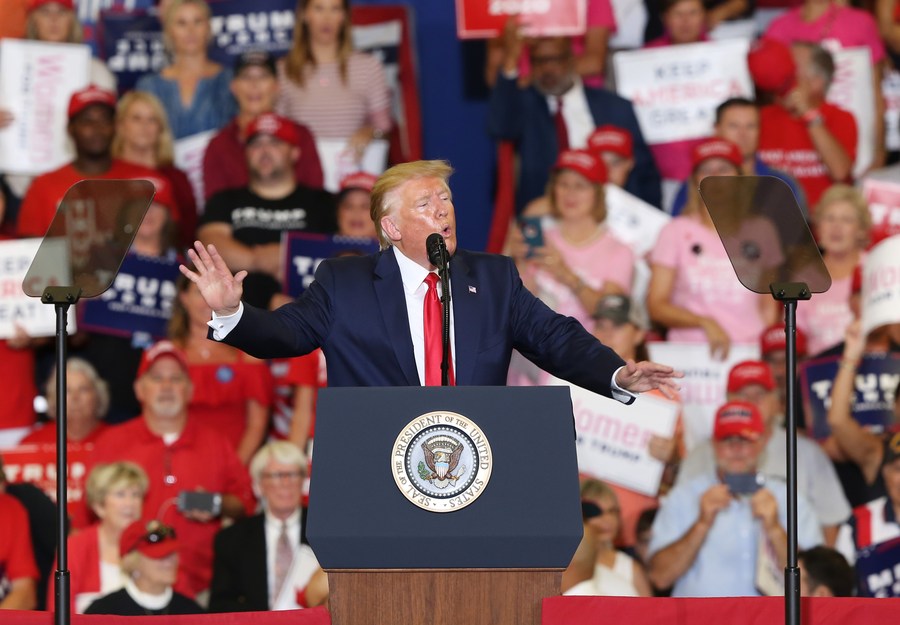


U.S. President Donald Trump participates in a campaign rally in Fayetteville, North Carolina, the United States, on Sept. 9, 2019. (Xinhua/Hu Yousong)
US President Donald Trump's re-election campaign on Sunday released Trump's second term agenda. "End our reliance on China" is one of Trump's 10 second-term goals. This mainly aims at bringing back 1 million manufacturing jobs from China.
However, it is not China that has stolen American jobs. The fundamental reason for the loss of American jobs is the hollowing out of US industries. Many US companies have chosen to set up factories in China because conditions are superior to those in the US. This is the rule-based, fair competition of the global market economy.
If Trump is reelected, he will first deal with the two major challenges: controlling COVID-19 and economic recovery. But he has failed to show his determination and ability to solve either of these challenges. It is difficult to expect the US, as the Trump campaign said in the agenda, to "return to normal in 2021" and "create 10 million new jobs in 10 months." These goals seem like pie in the sky.
With the "end our reliance on China" goal stated, the Trump campaign abruptly noted to "hold China fully accountable for allowing the virus to spread around the world." This indicates that Trump team plans to continue its targeting of China in the second term if re-elected.
By playing the China blame card, Trump is not only shifting domestic attention and attracting support, but also catering to the voices of domestic anti-China hawks and interest groups. In other words, the Republican Party has reached a high degree of consensus on Trump's policy toward China.
As the virus rages on in the US, Trump will not easily give up the tactic of blaming China because this seems to be working. If Trump is re-elected, it can be expected that he will continue to use the pandemic and other factors as excuses to suppress China.
In addition to targeting China, Trump has also continued his usual political style with other issues on the agenda. For example, the agenda includes "get allies to pay their fair share," "teach American exceptionalism" in education, "drain the globalist swamp by taking on international organizations that hurt American citizens" and prohibit US companies from replacing US citizens "with lower-cost foreign workers."
Trump's campaign strategy is basically the same as four years ago. He is trying to reproduce the successful battle in 2016 by relying on his base voters' support. The reason behind such a strategy is that under the multiple challenges of the epidemic, economic difficulties and racial tensions, Trump has to continue to take risks and embrace extreme right-wing forces.
But the problem is: The current situation between the Republican Party and the Democratic Party is different from four years ago. Trump still has his base voters, and the Republican Party will continue to support him, but the force opposing Trump and the cohesion of the Democratic Party are obviously stronger than four years ago.
In 2016, American voters may have found Trump's conservative policies attractive. But after four years of practice, Trump's second term agenda may not be attractive to voters, especially the swing and independent voters. Continuing such an extreme and conservative agenda may only be counterproductive.
The Republican Party's hysterical policy toward China has had a certain impact on the Democratic Party. For example, compared with the 2016 Democratic Party Platform, the "one-China" principle was removed in the 2020 version released on August 18. The 2020 version also mentions, "working with our allies to stand up to China."
The two parties are in a contest of who can be tougher on China. The current US' atmosphere toward China is at its worst since the end of the Cold War. This is not only reflected in the two parties' tough stance, but also in Americans' change of public opinion toward China.
According to a Pew Research Center survey on July 30, 73 percent of US adults say they have an unfavorable view of China - the highest rate since 2005. This is a manifestation of a major change in American society's perception of China.
Thus, no matter which party comes into power next, the US' policy toward China will not undergo a fundamental reversal. The difference between the two parties lies in the way they act tough against China. In the future, the China-US strategic competition will continue to intensify and the risk of a new cold war will exist. China-US relations will enter a period of extreme uncertainty.
The author is an assistant research fellow at the China Institute of International Studies. opinion@globaltimes.com.cn

 Award-winning photos show poverty reduction achievements in NE China's Jilin province
Award-winning photos show poverty reduction achievements in NE China's Jilin province People dance to greet advent of New Year in Ameiqituo Town, Guizhou
People dance to greet advent of New Year in Ameiqituo Town, Guizhou Fire brigade in Shanghai holds group wedding
Fire brigade in Shanghai holds group wedding Tourists enjoy ice sculptures in Datan Town, north China
Tourists enjoy ice sculptures in Datan Town, north China Sunset scenery of Dayan Pagoda in Xi'an
Sunset scenery of Dayan Pagoda in Xi'an Tourists have fun at scenic spot in Nanlong Town, NW China
Tourists have fun at scenic spot in Nanlong Town, NW China Harbin attracts tourists by making best use of ice in winter
Harbin attracts tourists by making best use of ice in winter In pics: FIS Alpine Ski Women's World Cup Slalom
In pics: FIS Alpine Ski Women's World Cup Slalom Black-necked cranes rest at reservoir in Lhunzhub County, Lhasa
Black-necked cranes rest at reservoir in Lhunzhub County, Lhasa China's FAST telescope will be available to foreign scientists in April
China's FAST telescope will be available to foreign scientists in April